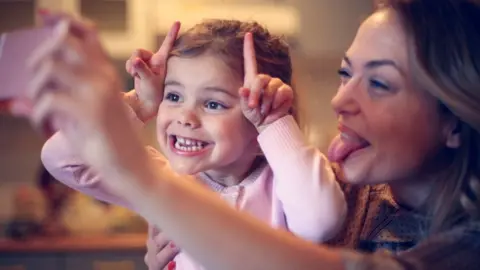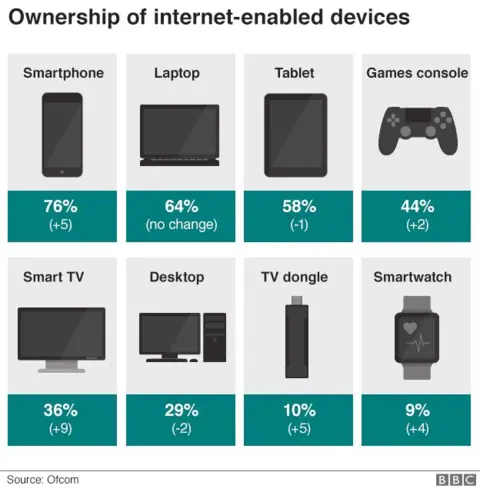Posting children's photos on social media divides nation
 Getty Images
Getty ImagesParents are divided about whether it is right to post photos of one's children to social media, according to a study by the UK's communications watchdog.
Ofcom reported that just over half of parents it surveyed said they avoided what it termed "sharenting" altogether.
A desire to protect the privacy of under-18s was the most commonly given reason, it said.
But about one in five parents said they posted such images at least once a month, the regulator added.
The figures are contained in the organisation's annual Communications Market Report.
It is based on an online survey of 1,000 adults carried out in April by YouGov.
Ofcom suggested that posting family videos and photos to social media had become a "Marmite issue" - a reference to the opinion-splitting food spread.
"Parents are really divided about whether it's sensible to share photos of their children online," Ofcom's consumer group director Lindsey Fussell told the BBC.
"The good news is that of those who do share, over 80% feel very confident about restricting who can see those photos... to friends and family, for example."
Of the abstainers, 87% said their offspring's lives should remain private, and 38% said their children would not want them to upload the material.
But 52% of the sharers said their children were happy for photos and videos of themselves to be online, and only 15% had concerns about what their children might think when they grew up.
 Getty Images
Getty ImagesMost of those questioned acknowledged that they tended to accept social media and messaging apps' terms and conditions without reading them, and half acknowledged it was not always easy to erase imagery from the net once it had been uploaded.
In light of the findings, the NSPCC children's charity urged parents to carefully consider the issues involved.
"Each time a photo or video is uploaded, it creates a digital footprint of a child which can follow them into adult life," said a spokeswoman.
"It is always important to ask a child for their permission before posting photos or videos of them.
"For very young children, think about whether they would be happy for you to post or if it will embarrass them. If you aren't sure, it's best not to post."
Selfie culture
The study also examined the care people took over the images they upload of themselves.
On average, it said, respondents took six photos of themselves for every selfie that they posted.
Moreover, it said, the popularity of filters in Instagram, Snapchat and Facebook as well as a plethora of face-enhancement apps had helped encourage nearly half of all selfie-snappers to take over a minute to edit the pictures before posting them.
The report also pointed to a disconnect between how people felt about their own self-portraits and what they thought about others': 61% of respondents said their own images were an accurate reflection of themselves, but 74% said at times other people's presented "rose tinted" versions of their lives.
Facebook v YouTube
The wide-ranging report also indicated that while there might be more Britons on YouTube (42 million) than Facebook (39.7 million), the latter appears to be more addictive.
In the summer of 2016, the watchdog released a smartphone-tracking app of its own for Android devices and analysed the data generated for 1,200 volunteers.
It revealed that on average the participants used Facebook's app 11.7 times a day. By contrast, the figure for YouTube was 2.6 times.


Other results from the report include:
- tablet ownership has declined for the first time, although Ofcom cautioned that the 1% annual drop might not be statistically significant
- close to 40% of the under-55s now own an internet-connected TV - whether it be because it is linked up to a games console, set-top box or dongle, or because it has built-in capability. This has helped encourage Brits to "binge" on several episodes of the same television programme in one sitting
- 9% of those surveyed said they watched films and TV shows on the toilet, and a matching number said they did so in the garden
- Snapchat saw the biggest growth among the mainstream social networks last year. It added 3.1 million UK members to take its tally to 10.3 million. However, the app still lags behind Pinterest, LinkedIn, Instagram and Twitter
- 88% of UK adults can now connect to the internet at home, but only 1% of those without access intend to get online in 2017
